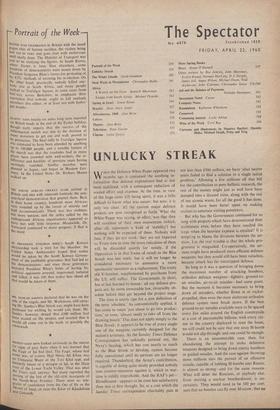UNLUCKY STREAK
WION the Defence White Paper appeared two. months ago it contained the soothing in- formation that defence expenditure had at last been stabilised, with a consequent reduction of wasted effort and expense. At the time, in view of the huge sums still being spent, it was a little difficult to know what was meant; but now, it is only too clear. All the current major defence projects are now recognised as futile. What the White Paper was saying, in effect, was that they will continue of their own momentum (which, after all, represents a kind of 'stability') but nothing will be expected of them. Nobody will fuss, if they do not work; they are not expected to. From time to time the more ridiculous of them will be discarded quietly (or noisily, if the Opposition is in that frame of mind) as the Blue Streak was last week; but it will no longer be considered necessary to announce a more spectacular successor as a replacement. The trusty old V-bomber, supplemented by, purchases from the US, will suffice. The Government, in short, has at last learned its lesson: all our defence pro- jects are, by some immutable law, invariably ob- solete before they get beyond the project stage.
The time is surely ripe for a new definition of the term 'obsolete.' As conventionally applied, it has come to mean 'just about to go into produc- tion,' or even, 'almost ready to take off from the drawing board.' This does not apply simply to the Blue Streak; it appears to be true of every single one of the weapons currently designed for the nation's armoury. As the Sunday Times Defence Correspondent has unkindly pointed out, the Navy's Seaslug, which has cost nearly as much as the Blue Streak to develop, cannot become fully operational until its services are no longer required. Thunderbird, the Army's contribution, is capable of doing quite nicely provided nobody uses counter-measures against it, which in war- time is mildly improbable. And the RAF's pet- Bloodhound—appears to be even less satisfactory than was at first thought. So, at a cost, which the Sunday Timer correspondent charitably puts at not lesS than £500 million, we have 'after twelve years failed to find a solution to a single initial problem.' Allowing a few millions off that bill for the contribution to pure ballistic research, the rest of the money might just as well have been dumped into a disused mine, along with the rest of our atomic waste, for all the good it, has done. It would have been better spent on making rockets to entertain visiting potentates.
But why has the Government continued for so long with projects which have demonstrated their uselessness even before they have reached the stage when the hea'viest expense is entailed? It is tempting to blame the divisions between the ser- vices. Eut the real trouble is that the whole pro- gramme is misguided. Co-operatively, the ser- vices might have produced more efficient defence weapons; but they would still have been valueless, because attack has far .outstripped defence.
So long as it was a question of bringing down the maximum number of attacking bombers, orthodox defence weapons—fighters, ground-to- air missiles, air-to-air missiles—had some point. But the moment it becomes necessary to bring down all intruders, whether flown in or rocket- propelled, then even the most elaborate orthodox defence system must break down. If the best ground-to-air missiles available were to be spaced every few miles around the English countryside e a cost of uncountable billions, with every citi- zen in the country deployed to man the bases, we still could not be sure that one stray H-bomb would not slip through; and one could be enough.
There is an unanswerable case, then, for abandoning the attempt to make defensive weapons designed to bring down enemy bombers or guided missiles. And the case against throwing more millions into the pursuit of an offensive missile, capable of lobbing H-bombs into Russia, is almost as strong—and for the same reasons. What will deter the Russians, or anybody else, from starting a nuclear bombardment, is un- certainty. They would need to be 100 per cent. sure that no bomber can fly over Moscow; that no nuclear submarine can emerge from under the icecap and demolish Leningrad. And they cannot be 100 per cent. sure. They cannot even be cer- tain that, at this moment, some nuclear weapon is not concealed in an apartment in a Moscow suburb, waiting to be set off as a reprisal (the exact locality, after all, matters little, provided the bomb is dirty enough).
Accurate missiles are not essential. The threat is sufficient. Even if it were insufficient, of course, there would still be an unanswerable case against the policy of the independent deterrent, on strate- gic as well as on economic grounds. No doubt this would have been recognised before, even by the Government, had it not been for the unfor- tunate belief that the existence of an independent British nuclear deterrent would help the Govern- nient out of its dilemma over conscription. When that scheme fell through, there had to be some delay, for the required face-saving period, to prevent Ministers from being made to look ridicu- lous. But now that the futility of the defence programme has been admitted on all sides, there seems to be a chance of sanity creeping in.











































 Previous page
Previous page